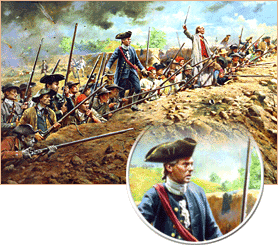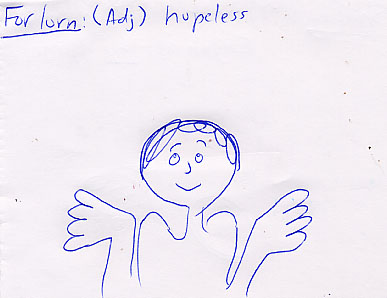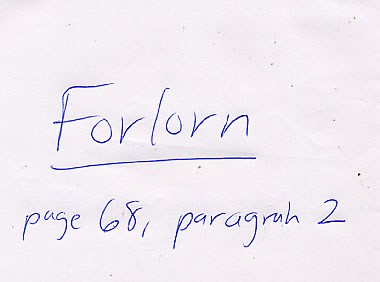A NOVEL OF REBELLION
By: Paul Samuel Jacobs

Picture: http://www.historicalartprints.com/new/index.shtml

Fifth Grade (above grade level)
Section 3 (pages 67-93)
Discussion Director
Your job is to develop a list of questions that your group will discuss
about this part of the book. You may come up with your own qestions,
or you may chose from the sample questions.
1 MCEOG
1 Compare/Contrast
1 Problem-solution
1 Prediction
1. Why is this passage important: "No, but a man does run
if he has reason to be frightened, sir," my father said. "For you
yourself know what a frightened man does run."
Answer: I feel that this states a person's true intentions
when trying to determine if he/she is scared or not; it is a character
issue. (page 73, paragraph 5-7)
2. Where does Captain Moseley think his Indian apprentice has
gone?
Answer: He thinks he has gone off to join King Phillip.
(page 73, paragraph 3)
3. What do you think Bartholomew Green will do in the upcoming
war?
Answer: I think he will try to stop the war but will inevitably
have to side with his own people. (Throughout this section and continuing
for the rest of the book he wrestles with this quandary)
Passage Picker
Section 3 (pages 67-93)
Your job is to pick passages from this section that you and your group
can talk about.
1) Pick out passage you would like to share
2) Write down the page and paragraph number
3) Write down the entire passage being used
4) Write down the first two words and the last two words of your passage
5) Write down the reason you chose the passage and explain why
6) Ask a question about your passage and give an answer
7) Write down the Author's purpose
Choose passages that satisfy these four reasons:
Character
2 Descriptive
1 MCEOG
1 Character
1. Character
2. page 73, paragraph 5
3. "A man does not run away unless he has treachery in his heart,"
said the captain.
4. “A man…the captain”
5. This passage deals the internal conflict one has when one
has a conscience
6. (Q) Why does the captain use make this remark?
(A) The captain is remarking about bravery and the character
judgment.
7. Author’s purpose: Behind this is to remind one
that people make judgments about one’s character based one his/her actions
regardless of the real reason behind it.
1. Descriptive
2. page 89, paragraph 5
3. "Scalpings, Sam said and much worse. I cannot tell you
all that I have seen. With our questions, Sam grew very serious."
4. “Scalpings, Sam…very serious. ”
5. This passage is indicative of the way people fought back in
these days.
6. (Q) Why does Sam seem so serious when asked about the
Scaplings?
(A) The horror of actually seeing it and much worse brings Sam
to a very serious state of mind.
7. Author’s purpose: To vividly describe the
horrors of warfare of the time.
Character Sketcher
Section 3 (pages 67-93)
Your job is to find an interesting character from this section you
read today. You will find three words that describe the character.
For each word, or character trait, you will give the proof or example (including
page and paragraph). The next thing you will do is tell one of the
character’s goals, or what the character wants to do in this section.
Then you will find one of the character’s problems in the section and the
solution or possible solution to the problem. Finally, you get to
have fun and illustrate your character!
Captain Moseley
Word Wizard
Section 3 (pages 67-93)
Your job is to look for special words in the story. On your recording
sheet, write down the following:
1. Write down the word
2. Copy the sentence from the book in which the word appears
3. Look up the word in the dictionary
4. Using context clues from the sentence and the dictionary definition,
write down in your own words the definition of the word
5. Write down the correct part of speech (noun, verb, adjective,
adverb)
6. Write a sentence of your own with word in it.
7. Make your word wizard card. Be sure to include in big
print your word and the page and paragraph number. On the other side
of the card should be a picture, the word, and the definition of the word.
1. militia (page 67, paragraph 3)
2. “Governor Leverett has promised to send our militia to join
the troops from Plymouth.”
3. Militia: 1. A body of men enrolled for military
service, and called out periodically for drill and exercise but serving
full-time only in emergencies. 2. U.S. able-bodied males of each
state between 18 and 45 years of age considered eligible for military service.
3. A body of citizen soldiers as distinguished from professional soldiers.
4. Militia: Civilian soldiers called up to bolster
the regular army.
5. Noun
6. During the Revolutionary War, the local militias were called
up to defend the Americas.
7. Have the kids make a Word Wizard Card
1. forlorn (page 68, paragraph 2)
2. “And even my mother who, unlike any of the others, looked
forlorn as my younger brothers rushed around, more like savages than any
Indian I had known.”
3. forlorn: 1. Desolate or dreary: unhappy or miserable,
as in feeling, condition, or appearance. 2. Abandoned, deserted,
or forsaken. 3. Hopeless; despairing. 4. Bereft; destitute.
4. Forlorn: Descriptive word for looking hopeless.
5. Adjective
6. I had a forlorned look on my face as I left the room.
7. Here is an example of a Word Wizard Card:


Two other possible words to be used:
1) roundabout
2) meandering
Connector
Your job is to connect the story with something that has happened in
your life. You will need to write it down and share with
your group. You will also need to get your group sharing about things
that they can also connect with the story.
Passage: Just then…James Head (page 71, paragraph 5)
This passage reminded me of when I was a child. There was always
someone watching every move that I made. I can understand how they
felt (paranoid) when they were constantly reminded that they were being
watched.